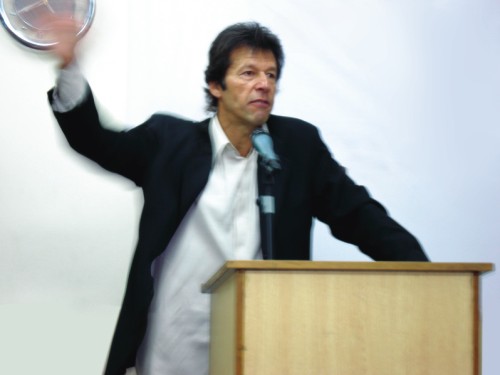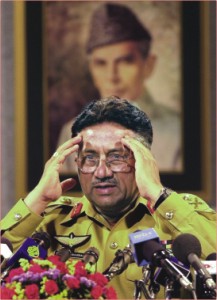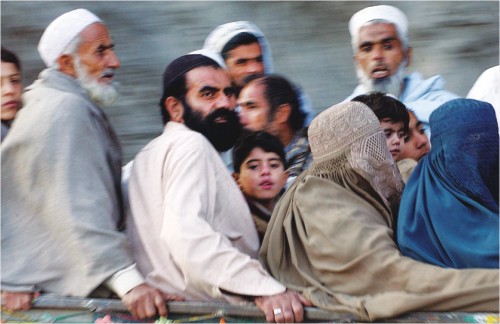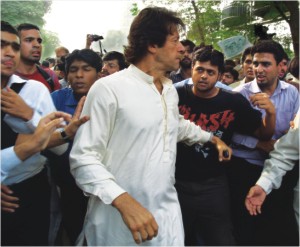
Inside
|
“I was conned” Imran Khan presents his case to Asif Saleh Two months ago, when I went to see Imran Khan present his case to an audience in England, my prime interest was in asking what made him support General Pervez Musharraf in the first place? I did not have to wait very long. When the Q & A started, that was the one of the first questions asked. Khan's reply to the question was short and apologetic: "I was conned." As General Musharraf emerges as the latest military messiah-turned-dictator to face a possibly inglorious end, perhaps the lessons of Imran Khan are lessons for all those who look towards the military to offer quick fire solutions and meaningful "democracy."
Here are Imran Khan's replies to a number of other crucial queries that day: On the background of his joining politics Eventually, desperate, I decided to tour Pakistan from one end to another in an open jeep and collect money that way. I found that people who had nothing, any time they saw the truck coming, they came by and gave me whatever they had in their pockets. There are moments in life that change your direction. This was one of those moments. Here I saw the real Pakistanis on whose hard work the country was functioning and there sat a tiny elite who hogged all the resources, went to all the good schools but didn't give anything back to the society or never thought about the poor people. Practically, the elites did not care. Whoever came to power, whether it is military dictatorship or democratic government, they became close to them and became part of the power structure. The majority would always be deprived from their very basic needs. They would go to Urdu medium schools, and then become unemployed once they got their degrees. The best jobs would go to the elites who went to the best English medium schools. Similarly if you could afford bottled water, you were fine. But 500,000 children died of waterborne diseases last year alone. Ninety-five percent of the taxation was indirect which meant that the poor were subsidising the rich. Same thing is true with the justice system. You wouldn't find any rich person in jail. That's when I decided that if I wanted to bring about a change in the country, it was not going to be through social work. It had to be done through politics.On the motto of justice instead of more basic needs In my own constituency, all four members from different parties who ran against me have now joined Musharraf's party -- simply because they cannot afford to be on the wrong side of the power structure. The biggest example is our very own Asif Zardari. He switched between the prime minister's house and jail as his party went in and out of power. This is where the problem lies. You cannot have proper democracy in a country where the judiciary does not touch criminals because they are close to the power. Because of that, all criminals then want to be in power and they will use power to plunder the country. Hence we started Tehriq-i-Insaaf the movement for justice. On the backdrop of the current crisis But once the judge refused to resign, a series of events started happening in Pakistan, which in my opinion are the most exciting things to happen in recent history. Three top intelligence agents came to him, he was under house arrest for three days. When he attempted to go to the Supreme Court, everyone saw that a policeman pulled his hair and shoved him in the car. Now the real heroes who made these incidents into defining moments for Pakistan politics are the independent television media. What has changed in Pakistan and what Gen. Musharraf did not realise is that the independent television channels have changed the country. The level of political awareness is at its peak in Pakistan now. This is where the miscalculation took place. After the chief justice refused to resign, these television channels highlighted every single mistake committed by the government. The leadership in this movement for justice was provided, sadly not by us politicians, but the lawyers of the country. All the elected bar associations stood by the chief justice. Instead of the movement getting dissipated, it grew and grew. The journey to Lahore by the chief justice, that normally takes 4 hours, took him 28 hours because so many people came to greet him.
On why this is an exciting time Because once the judiciary is independent, that is what is going ensure an independent Election Commission, which we have never had in our history. The Election Commission has always been influenced by the military establishment. Whenever we have an election, we don't get the results right away -- because the results first go the 'General's Headquarters,' where they are vetted and then released. As we are close to having an independent judiciary, which will then lead to an independent Election Commission, we will then have a truly free and fair election. On the importance of a free election Because, you see, their lives depend on politics. So, everyone in the rural area understands the political issues. I firmly believe if they could vote out of their free will, they would have voted for the people who they felt would be good for them. The problem is that they are too scared to vote for the right people because they are often subjected to political victimisation. After the election in my constituency, a lot of people came to me and said we want to vote for you but we know you will not be in power. So how will you protect us? This is where the problem lies. This is why you need a democratic system and you cannot have a general democratic system without an independent judiciary. You cannot imagine the sort of political victimisation that goes on. They will cut the water supplies of villages. Schoolteachers will suddenly be transferred. So you can't have a proper democracy in the country unless people are protected from political victimisation and that can only be done by an independent judicial system. On Musharraf's future
But in reality we would have a better chance of fighting extremism post-Musharraf than we do right now. Because, if you look at the situation since 2001, extremism has risen up and up. There is more radicalisation in Pakistan than ever before. If the military was the answer, surely extremism should have decreased. The truth is extremism cannot be fought by a general with a gun in his hand. Extremism can best be fought by a comprehensive democratic system where you have freedom of expression, where you have an open society, where you allow the people to marginalise the extremists. In the last two dictatorships under General Zia and General Musharraf, extremism has exacerbated and the religious parties have taken a big chunk of the pie. But whenever you allow people to vote in a democracy, they always vote for the moderate parties. So the answer to all the fearful Bushes and Blairs of the world is that they are barking up the wrong tree by backing military dictators. The way to deal with extremists is when you allow people to sideline the extremists, and not by holding a gun to their head. A final word to the audience Asif Saleh is a member of the Drishtipat Writers' Collective. Photos: AFP |



 On post-Musharraf scenarios
On post-Musharraf scenarios